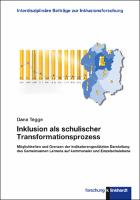Inklusion als schulischer Transformationsprozess
Möglichkeiten und Grenzen der indikatorengestützten Darstellung des Gemeinsamen Lernens auf kommunaler und Einzelschulebene
Abstract
With the development of inclusive schools comes a broad range of new challenges within the whole German education system. According to the different responsibilities in the educational governance of the German system, not only the state level but also the district level has an important role in the reorganization process towards an inclusive school system. This doctoral thesis thus aims at developing a set of educational indicators at district and individual school level that provides information about the inputs, processes and outputs of inclusive schooling, i.e. conditions and school organizational aspects such as experience in dealing with heterogeneity (special educational needs, migration, gender, etc.). Thereby it can also provide a foundation for continuous, largely data-based observation and analysis of the implementation process of school inclusion. This kind of monitoring can inform both German educational policy and the public regarding contexts, process characteristics, outcomes and benefits of inclusive schooling. The main question of the thesis thus is: What indicators can be identified to describe and reflect developments in the implementation of an inclusive school system at the district level? This is addressed by a three-step analysis, exemplified by a typical German municipality in North Rhine-Westphalia. (1) Starting with an analysis of available school statistics in the period from 2007 to 2015 (2), the results are supplemented by a quantitative school-leadership survey in 2016 (3). A synthesis of the given results marks the last step with a characterization of the transformation process at school and district level. The framework of indicators is meant to identify general problems and offer an empirical foundation for the information on inclusive schooling in German municipalities, thus providing valid governance knowledge for a holistic, coherent educational management as well as contributing to improve the quality of inclusive education at district level. (DIPF/Orig.) Die Umsetzung des Inklusionsgedankens konfrontiert das gesamte Bildungssystem mit neuen Herausforderungen. Entsprechend der föderalen Zuständigkeiten sind dafür neben dem Land auch Kreise und Schulträger in der Pflicht, die Entwicklung mitzugestalten. Derzeit gibt es nur wenig systematisierte Informationen über den Stand der inklusiven Bildung im Schulsystem auf kommunaler Ebene. Dies hängt auch mit einer weitgehenden Unklarheit zusammen, welche Bemessungsgrundlagen für eine Einschätzung der Qualität inklusiv arbeitender Schulen zur Verfügung stehen, insbesondere vor dem Hintergrund der lokal höchst unterschiedlichen Formen der Unterrichtsorganisation sowie ungleichen Voraussetzungen im Hinblick auf Ressourcenverteilung (personell, räumlich und sächlich) und Schülerklientel (sonderpädagogischer Förderbedarf, soziale Herkunft, Migrationshintergrund, etc.). Untersucht werden am Beispiel des Flächenkreises Paderborn die Möglichkeiten und Grenzen, die Entwicklung des Gemeinsamen Lernens im Bereich Schule indikatorengestützt abzubilden und Schlussfolgerungen für inklusive Schulorganisation und -planung auf kleinräumiger Ebene abzuleiten. Die Hauptfrage der Arbeit lautet: Welche Indikatoren lassen sich auf kommunaler Ebene identifizieren, um Entwicklungen in den Dimensionen Input, Prozess und Output bei der Umsetzung eines inklusiven Schulsystems zu beschreiben? Die Beantwortung der Forschungsfrage folgt einem dreistufigen Vorgehen. In einem ersten Schritt werden auf Basis kleinräumiger und einzelschulischer Daten der amtlichen Schulstatistik indikatorengestützte Analysen im Zeitraum von 2007 bis 2015 durchgeführt. Im Anschluss werden diese datengestützten Befunde durch Ergebnisse einer quantitativen Schulleiterbefragung im Kreis Paderborn 2016 ergänzt. In einem letzten Schritt erfolgt drittens eine Charakterisierung des nachgezeichneten Transformationsprozesses auf Einzelschulebene sowie auf kommunaler Ebene. Die Synthese der gewonnenen Forschungsergebnisse bildet den Ausgangspunkt für die Ableitung von aussagekräftigen Indikatoren und Desideraten einer Dauerbeobachtung des Gemeinsamen Lernens von Schülerinnen und Schülern mit und ohne sonderpädagogischen Förderbedarf. Wenngleich bestimmte Qualitätsaspekte schulischer Inklusion mit den verfügbaren amtlichen und den ergänzenden Schulleiterdaten nur näherungsweise indikatorisiert werden können, wird sowohl kommunalen Entscheidungsträgerinnen und -trägern aus Politik und Verwaltung, als auch Akteurinnen und Akteuren in den Bildungseinrichtungen ein breites Spektrum an Operationalisierungen zur Verfügung gestellt, um Ansatzpunkte zur organisationalen und systemischen Weiterentwicklung von Inklusion im Schulbereich auszumachen. (DIPF/Orig.)
Keywords
Inklusion; Bildungsentwicklung; Bildungsbeteiligung; Bildungserfolg; Sonderpädagogischer Förderbedarf; Schulqualität; Integrative Schule; Integrative Beschulung; Schulorganisation; Schulplanung; Gemeinde <Kommune>; Schulleiter; Schulentwicklung; Transformation; Sozialraum; Indikator; Amtliche Statistik; Umfrage; Statistische Analyse; Quantitative Forschung; Paderborn; Nordrhein-Westfalen; Deutschland; Inclusion; Development of education; Educational development; Participation in education; Participation Rate; Educational Success; Success at school; Success in Education; Special Educational Needs; Inclusive education; Inclusive school; School organisation; School organization; Headteacher; Headteachers; School head teacher; School development; Indicator; Official statistics; Statistical analysis; Quantitative research; North Rhine-Westphalia; North-Rhine Westphalia; GermanyDOI
10.35468/5810ISBN
9783781523784, 9783781558106, 9783781523784Publisher
Verlag Julius KlinkhardtPublication date and place
Bad Heilbrunn, 2020Series
Interdisziplinäre Beiträge zur Inklusionsforschung,Classification
Teaching of students with different educational needs


 Download
Download Web Shop
Web Shop